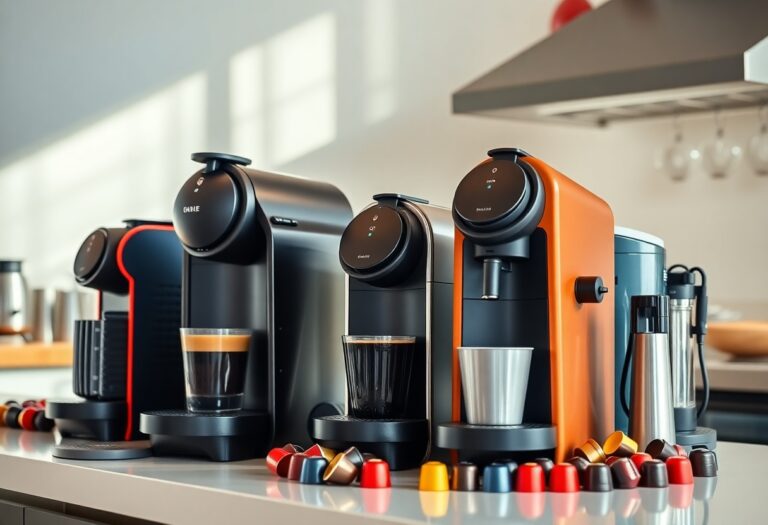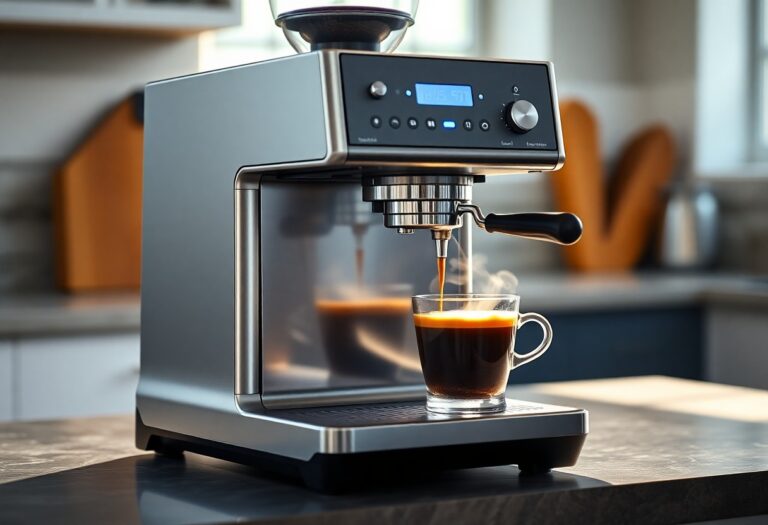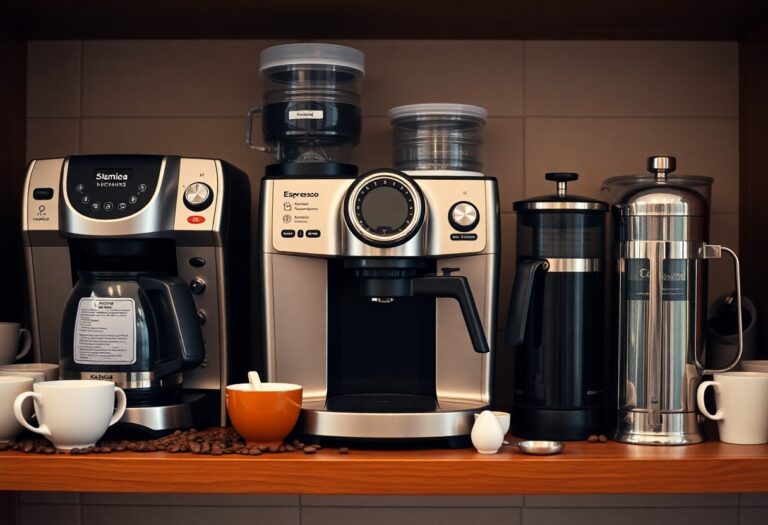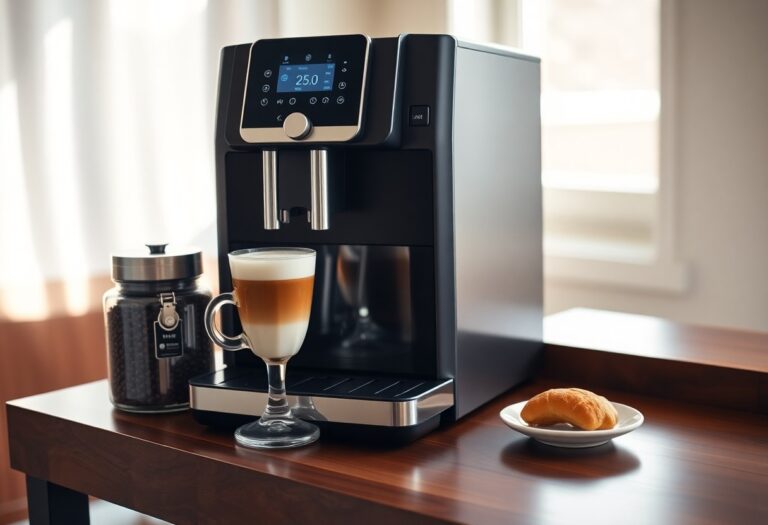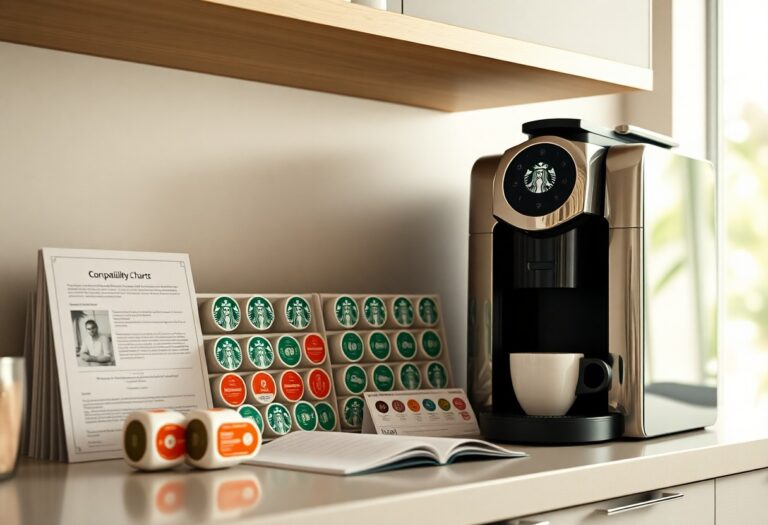What is a Commercial Coffee Machine – Business Equipment
With an increasing demand for high-quality coffee in various business settings, understanding what a commercial coffee machine entails is vital for you. These machines are designed to provide efficiency and consistency in brewing large quantities of coffee, making them an invaluable asset for your café, restaurant, or office. You’ll find a range of options to fit your specific needs, ensuring that your customers enjoy a rich and flavorful coffee experience. This post will guide you through the key aspects of commercial coffee machines and their importance in your business equipment arsenal.
Key Takeaways:
- Commercial coffee machines are specifically designed for high-volume coffee production, making them crucial for businesses such as cafés, restaurants, and hotels.
- These machines come in various types, including espresso machines, drip coffee makers, and single-serve units, each catering to different brewing methods and customer preferences.
- Features such as dual boilers, automatic milk frothers, programmable controls, and grinders enhance efficiency and consistency in coffee preparation.
- Investing in a quality commercial coffee machine can significantly improve the customer experience and boost sales by offering a diverse menu of coffee beverages.
- Regular maintenance and proper usage are vital to ensure longevity and optimal performance of the equipment.
The Anatomy of a Commercial Coffee Machine
A commercial coffee machine is a sophisticated piece of equipment designed for high-volume coffee production. Understanding its anatomy helps you appreciate how it serves a busy environment – whether in a café, restaurant, or office. For a deeper dive, check out The Complete Guide to Commercial Coffee Machines.
Key Components and Features
Your commercial coffee machine comprises several key components that work together to brew the perfect cup. These include the water reservoir, heating element, brew group, and steam wand. Each part plays a vital role in creating consistent flavor and temperature in your coffee. The quality of these components can drastically impact your end product, making it vital to choose a machine with reliable features.
Functionality and Mechanisms
The inner workings of a commercial coffee machine involve a series of intricate mechanisms that ensure efficiency and quality. Water is heated to the ideal temperature and then pumped through ground coffee at the correct pressure, enabling optimal extraction of flavors. Steam wands allow for frothing, which is key for lattes and cappuccinos.
Through a combination of pressurization and temperature control, your machine can produce various coffee styles, from espresso to Americano. User-friendly programming often enables you to customize brew strength and size, while advanced machines may even connect with apps for monitoring and maintenance. Knowing how each functionality impacts the brewing process allows you to better satisfy your customer’s palate and manage your operation more effectively.

Selecting the Right Equipment for Your Business
Finding the perfect commercial coffee machine involves understanding your specific business environment and customer preferences. You’ll want to assess factors like expected volume, style of drinks, and available space. The machine you choose should align with both your operational goals and the experience you want to offer your customers, thus ensuring efficiency and satisfaction.
Evaluating Your Business Needs
Start by defining the scale of your operation. Are you a small café serving a few dozen customers daily or a bustling restaurant aiming to serve hundreds? Consider your menu offerings too; if you plan on serving gourmet espresso drinks, a high-end machine is necessary. Understanding your clientele can also inform your choice—tech-savvy customers may appreciate drink customization options.
Comparing Different Brands and Models
Exploring the diverse brands and models of commercial coffee machines will help you spot the best fit for your business. Popular brands each have their strengths; for instance, Breville is known for user-friendly features while La Marzocco is recognized for its quality and durability. Narrow down your options by assessing the build, technology, and price range.
Comparing Different Brands and Models
| Brand | Key Features |
|---|---|
| Breville | User-friendly, compact, perfect for small spaces |
| La Marzocco | Excellent durability, consistent high-quality espresso |
| Nuova Simonelli | Great for busy settings, fast brewing |
| De’Longhi | Sleek designs, multi-functional options |
Every brand has unique qualities tailored to specific business needs. For example, Nuova Simonelli machines are designed for high-volume environments, often featuring rapid heating systems. In contrast, brands like Gaggia may cater more to artistic espresso lovers with features that enhance brew quality. Identifying your priorities—be it speed, user-friendliness, or advanced technology—will streamline the selection process.
Cost-Benefit Analysis of Commercial Coffee Machines
Investing in a commercial coffee machine can deliver significant returns when you factor in the long-term benefits alongside the initial costs. A detailed How Do Commercial Coffee Machines Work? | Aquacool analysis shows how these machines can rapidly enhance your operation’s efficiency, quality, and profitability compared to lower-cost alternatives.
Initial Investment vs. Long-Term Savings
The initial price tag of a commercial coffee machine can be daunting, but think of it as a gateway to long-term savings. High-quality machines typically reduce operational costs through energy efficiency and durability. For instance, premium models are often built to last and minimize repair fees, potentially saving you hundreds annually on maintenance and replacements.
Impact on Customer Experience and Revenue
A high-quality commercial coffee machine is not merely a piece of equipment; it serves as a pivotal tool in enhancing your customers’ experience. Reliable, flavorful coffee draws in customers and encourages repeat visits, bolstering overall revenue. Businesses that invest wisely can see a consistent increase in sales, with reports suggesting up to a 20% rise in profitability after upgrading to premium machines.
The enhancement of customer experience is directly tied to the quality of the coffee served. Positive customer interactions, fueled by a delicious brew from a top-tier machine, lead to higher customer retention rates. You can also upsell specialty beverages, leading to increased average order values. Patrons who enjoy their coffee are likely to share their experiences, further driving foot traffic and sales through word-of-mouth referrals.

Maintenance and Longevity: Ensuring Optimal Performance
To keep your commercial coffee machine functioning at its best, it’s vital to implement a regular maintenance schedule. Proper upkeep not only extends the life of your machine but also ensures consistent flavor and quality in every cup. Regular inspections, timely repairs, and attentive cleaning practices can help prevent costly breakdowns and preserve the equipment’s performance over time.
Routine Cleaning and Maintenance Practices
Establishing routine cleaning protocols is key to maintaining your commercial coffee machine. Daily backflushing, descaling every few months, and replacing water filters as required can significantly enhance your machine’s performance. Always refer to the manufacturer’s guidelines for specific maintenance schedules tailored to your model. Consistent attention to cleaning keeps your equipment operating smoothly and produces high-quality coffee.
Common Issues and Troubleshooting Tips
Even with diligent care, commercial coffee machines can face issues such as inconsistent brewing temperatures, clogged filters, or leaks. To troubleshoot these problems, regularly check seals, clean the brew group, and ensure water supply connections are secure. Having a checklist can help you identify and address issues quickly, minimizing downtime and keeping your coffee service running seamlessly.
- Inconsistent brewing temperatures can indicate a malfunctioning thermostat.
- Clogged filters are often the result of inadequate cleaning.
- Leaks may stem from worn seals or loose connections.
- Any mechanical issue should be investigated promptly to ensure smooth operation.
Being aware of common issues can dramatically lessen downtime for your coffee business. For instance, if you face inconsistent brewing, try recalibrating your machine’s settings or checking for blockages in the water line. Develop a troubleshooting guide that includes frequent concerns and their solutions tailored to your equipment to minimize disruption. This proactive approach will help you maintain your service quality.
- Inconsistent brewing can be resolved by checking the water temperature settings.
- Blockages in the machine may require thorough cleaning with the right tools.
- Electrical issues should be evaluated by a qualified technician.
- Any unexpected malfunction warrants immediate attention to prevent further damage.
The Future of Commercial Coffee Machines: Trends to Watch
The landscape of commercial coffee machines is evolving rapidly, with several trends set to define the future. As advancements in technology and a growing emphasis on sustainability shape consumer preferences, you can expect machines that not only enhance efficiency but also commit to ethical sourcing practices. With a focus on automation and personalization, coffee experiences will be redefined, offering tailored options that cater to diverse tastes and dietary needs.
Innovations in Technology and Design
Advancements in technology are pushing the boundaries of commercial coffee machines. Features like AI-powered brew settings and smart connectivity are becoming standard, allowing you to monitor your machines remotely and optimize performance. Sleek, user-friendly designs are also emerging, making it easier for your staff to operate machines efficiently while delivering a consistent quality drink.
Sustainability and Ethical Sourcing Considerations
Growing consumer consciousness around environmental issues is prompting coffee machine manufacturers to prioritize sustainability. You have more options for machines made from recyclable materials and those that feature energy-efficient technologies. These machines reduce waste and align with your ethical sourcing commitments.
In today’s competitive landscape, businesses like yours play a critical role in promoting sustainable practices. By selecting commercial coffee machines designed with eco-friendly materials and energy efficiency in mind, you not only decrease operational costs but also attract a clientele that values sustainability. Additionally, choosing suppliers that focus on fair trade coffee ensures that your coffee sourcing supports farmers and contributes positively to their communities. Certifications such as Rainforest Alliance or Fair Trade can enhance your brand image while fostering long-term relationships with socially responsible producers. Investing in sustainability isn’t just good for the planet; it’s becoming an integral part of consumer expectations in the coffee industry.
To wrap up
On the whole, understanding what a commercial coffee machine is can significantly impact your business’s efficiency and customer satisfaction. These machines are specifically designed to handle high volumes and produce consistent quality, making them an necessary piece of equipment for any coffee-focused establishment. By choosing the right commercial coffee machine, you can enhance your service and elevate the overall experience for your customers, ultimately driving more success for your business. Investing in quality equipment is key to establishing a strong brand presence in the competitive coffee market.
FAQ
Q: What is a commercial coffee machine?
A: A commercial coffee machine is a high-capacity coffee brewing device designed for large-scale use in cafés, restaurants, and other hospitality environments. Unlike home coffee makers, these machines are built to handle high volumes of coffee preparation and often feature advanced brewing technology, offering various options such as espresso, drip coffee, and specialty brews.
Q: What are the different types of commercial coffee machines?
A: There are several types of commercial coffee machines, including espresso machines, drip coffee makers, pod systems, and brewing equipment for cold brew. Espresso machines come in both manual and automatic varieties. Drip coffee makers are ideal for large volumes of coffee, while pod systems offer convenience. Cold brew systems are specifically designed to produce coffee infused with cold water over extended periods.
Q: How do I choose the right commercial coffee machine for my business?
A: When dicking out a commercial coffee machine, consider factors such as the expected volume of coffee sales, the menu offerings, space availability, and your budget. Evaluate whether you need an espresso machine, drip coffee maker, or a combination unit based on your customer preferences. Additionally, research the machine’s durability, ease of use, and maintenance requirements.
Q: What maintenance is required for a commercial coffee machine?
A: Regular maintenance is key to ensuring optimal performance of a commercial coffee machine. This includes routine cleaning of the machine’s components, descaling to remove mineral buildup, and regular inspections for wear and tear. It’s also advisable to have a professional technician service the machine periodically to address any technical issues that may arise.
Q: Can a commercial coffee machine enhance my business revenue?
A: Yes, investing in a commercial coffee machine can enhance your business revenue by allowing you to offer high-quality coffee drinks that attract customers. Having a diverse coffee menu, including specialty drinks, can increase sales. Additionally, quick and efficient coffee preparation helps improve customer service, which can lead to repeat visits and higher overall sales.



